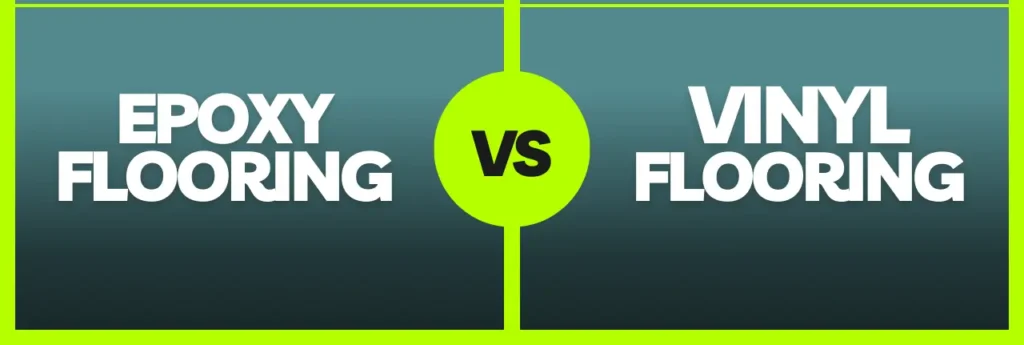With numerous options, choosing the right flooring for your home or business is not so easy. Among the options you have, epoxy and vinyl flooring most popular and rank high in terms of demand. Both materials have their merits and possible flaws. Understanding the differences between epoxy and vinyl flooring will help you to make an informed and correct decision based on your needs, style, preferences, and budget.
In the following article, we will be taking an in-depth look at epoxy and vinyl flooring by comparing their pros against their cons and helping you to make a decision on which floor will suit you best.
What is Epoxy Flooring?
Epoxy flooring consists of flooring material resulting from an applied resinous coating onto concrete. It generally boasts effectiveness in durability and resistance against stains, chemicals, and wear. Generally, it serves garages, warehouses, and other industrial premises, while nowadays, its use in residences is fast gaining great favor.
How is Epoxy Flooring Applied?
Epoxy flooring installation starts with cleaning and preparing the concrete surface. Then, the epoxy resin is mixed with a hardener and applied in layers over the surface. The coating may be allowed to cure for several hours or days depending on the type of epoxy is applied.
What is Vinyl Flooring?
Vinyl is another kind of flooring made synthetically with polyvinyl chloride (PVC). This could be in sheet form, tile, or planks, and often designed to look like wood, stone, or tile. Due to its versatility and light upkeep, vinyl flooring continues to feature predominantly both in residential and commercial places.
How to Install Vinyl Flooring?
There are different ways through which vinyl flooring is installed. Glued, clicked into place, or laid as peel-and-stick tiles-vinyl flooring is a breeze to install and hence highly sought after by DIY enthusiasts.
Pros and Cons of Epoxy Flooring
Pros of Epoxy Flooring
Durability
Epoxy floors are incredibly durable, able to withstand heavy foot and machinery traffic, including vehicles. In this respect, it is suitable for all types of industrial spaces such as warehouses, garages, and factories.
Chemical and Stain Resistance
One of the best aspects with epoxy flooring is its fantastic resistance to chemicals, oil, and stains. Companies in the manufacturing or automobile sector will find their spills just sitting on the top of epoxy floors without absorption.
Low Maintenance
Epoxy floors are not at all high maintenance. Cleaning is pretty easy: just regular sweeping and mopping. They do not need waxing or special treatments, making them low maintenance.
Aesthetics
The color, pattern, and finish of epoxy flooring can be varied. In fact, you can select from various designs that include metallic, glossy, and matte aspects, making it work both for commercial and residential areas.
Easy to Clean
Because epoxy floors are non-porous, they are easy to clean. Dust, dirt, and spills can be wiped away without much effort, which make them ideal mostly for kitchens, hospitals, and other high-traffic areas.
Cons of Epoxy Flooring
Cost
Epoxy flooring is generally quite expensive than other types of flooring. The installation process can also be labor-intensive, adding to the overall cost. However, for the long-term durability it is often justifies the initial investment.
Slippery When Wet
While resistant to stains and chemicals, epoxy floors can be slippery when wet. This can be a safety concern in some environments. But by using non-slippery components in epoxy resin is the solution of this problem.
Pros and Cons of Vinyl Flooring
Pros of Vinyl Flooring
Affordability
Vinyl is a affordable option, compared to epoxy flooring and many other types of flooring. This makes it an excellent choice for budget-conscious homeowners and business owners.
Ease of Installation
Vinyl flooring is very easy to install, especially in the form of peel-and-stick tiles or click-lock planks. Even DIY beginners can install vinyl flooring without the need for professional help.
Variety of Styles
Vinyl flooring is available in an extremely wide range of styles, colors, and patterns. From the look of hardwood to stone to traditional tile, there’s a vinyl option for anyone. And with so many customization options available, matching the aesthetic of your space is relatively easy.
Low Maintenance
Like epoxy flooring, vinyl is similarly easy to clean and require minimal maintenance. Most of the time, sweeping regularly and mopping once in a while will be enough to keep vinyl above par.
Disadvantages of Vinyl Flooring
Durability
While vinyl flooring is generally tough, it is not as resilient as epoxy. It may scratch or dent in case heavy objects fall on it. Although higher-quality vinyl can resist such accidents better, it is still not as long-lasting as epoxy in certain environments.
Not Suitable for High-Impact Areas
Vinyl flooring may not be the best choice for areas with heavy machinery or vehicle traffic. It can become damaged over time in environments where epoxy would thrive.
Environmental Impact
Vinyl flooring is made from PVC, which is a non-biodegradable material. While some vinyl floors are made with recycled content, but they are still not as eco-friendly as other flooring options.
Fading
Vinyl flooring can fade over time, especially if it is exposed to direct sunlight for extended periods. To minimize fading, it’s important to keep window coverings in place and consider UV-resistant vinyl options. But in most case, that is not possible.
Comparing Epoxy and Vinyl Flooring
1. Cost
Epoxy: Generally a bit expensive due to the materials and labor involved in installation.
Vinyl: Affordable than epoxy, especially for DIY installations.
2. Durability
Epoxy: Extremely durable. It is also resistant to stains, chemicals, mostly in heavy traffic.
Vinyl: Durable for residential and light commercial use, but not as strong as epoxy and so it is not recommended in high-traffic or industrial environments.
3. Installation
Epoxy: Requires professional installation and a curing time of several hours or days.
Vinyl: Easy to install, with many options for DIY installation.
4. Maintenance
Epoxy: Low-maintenance and easy to clean.
Vinyl: Also low-maintenance, but may need replacement or repair for scratches or dents over time.
5. Aesthetic Options
Epoxy: Highly customizable, with many color and finish options. You can turn your dream design into reality easily by epoxy flooring options.
Vinyl: Wide variety of styles, including options that mimic wood and stone.
Which One is Right for You?
Choosing between epoxy and vinyl flooring depends on your specific needs:
Choose Epoxy Flooring if:
You need a durable, long-lasting floor for high-traffic or industrial areas.
You are willing to invest in professional installation and long-term performance.
You want the floor to be resistant to most chemicals and stains and wear well.
You want unique, aesthetic and attractive look.
Choose Vinyl Flooring if:
You are on a slim budget and want the least expensive option.
You also want an easy floor installation and maintenance process.
At the end
Ultimately, both epoxy and vinyl have their strong points. Considering your particular needs, budget, and the surroundings in which it is being used, one can best make a decision for a place. Whether you opt for the strength of epoxy or the flexibility and affordability of vinyl, both options can offer long-lasting beauty and functionality.


